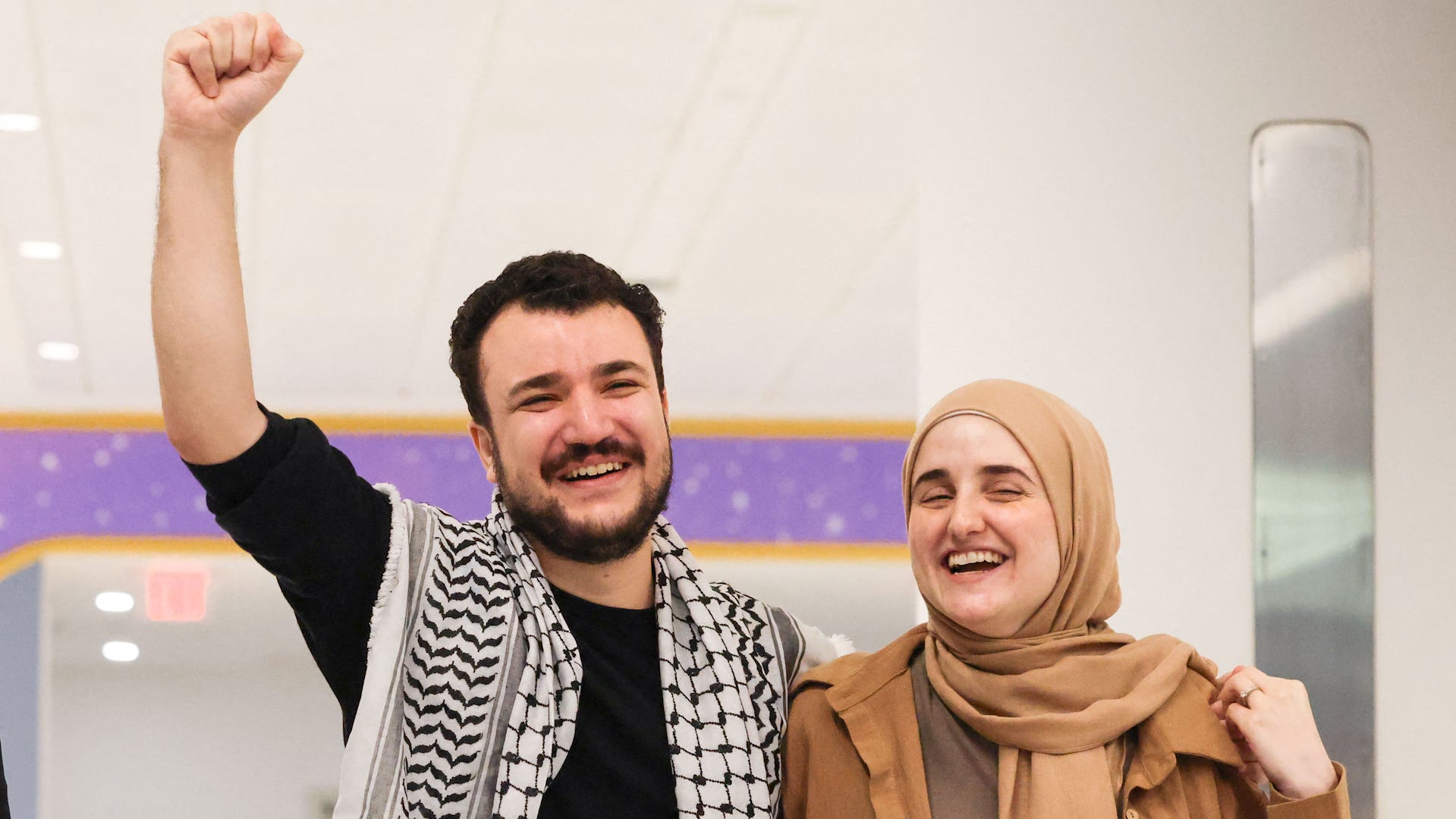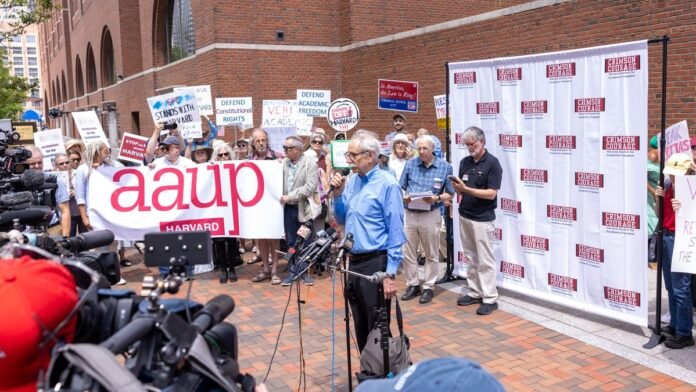A two-week federal trial concluded in Boston over the Trump administration’s deportation policies and how they impact the free speech rights of visa and green card holders.

Columbia activist Mahmoud Khalil returns home after ICE detention
Columbia activist Mahmoud Khalil greeted supporters at Newark International Airport after being released from immigration detention.
- On March 25, American Association of University Professors and its chapters at Harvard, New York and Rutgers universities sued Secretary of State Marco Rubio and the Trump administration.
- At issue was whether the administration was targeting those on campus for speech related to the Israel-Hamas war.
- A two-week trial took place in federal court in Boston before U.S. District Court Judge William Young.
- The trial concluded July 21. The judge has not yet ruled.
BOSTON − Do visa and green card holders have First Amendment rights to express views on controversial foreign policy issues, particularly on college campuses?
That question was at the heart of a two-week trial that concluded July 21 between the Trump administration and the State Department and a group of university professors from across the nation − including at Harvard University.
It is a major First Amendment case with implications across higher education and beyond. It took place one courtroom over from another involving the administration and its federal research funding cuts aimed at Harvard, a case where lawyers also raised key First Amendment issues.
The administration has argued that it can deport visa and green card holders under the Immigration and Nationality Act, which has a provision granting the secretary of state the authority to remove people from the country if they undermine its foreign policy interests.
But the trial in American Association of University Professors v. Rubio, which began on July 7, raised questions about whether the administration was violating the First Amendment by retaliating against people for their political speech.
The lawsuit − filed March 25 on behalf of the association’s campus chapters at Harvard, New York and Rutgers universities, along with the Middle East Studies Association − accused the administration of fostering a “climate of repression and fear on university campuses.”
The trial came amid the backdrop of a high-profile case involving Mahmoud Khalil, a Columbia University graduate and pro-Palestinian activist. Last month, a federal judge in New Jersey ordered Khalil released from Immigration and Customs Enforcement custody.
That judge had previously ruled that the government’s actions were chilling Khalil’s right to free speech. The Trump administration has said the basis for its March 8 detention was Khalil’s supposed alignment with Hamas, a designated terrorist group.
Trump administration ‘systematically violating the First Amendment,’ lawyers say
Here in Boston, closing arguments took place before U.S. District Judge William Young, a Harvard Law School graduate.
Knight First Amendment Institute at Columbia University, along with co-counsel Sher Tremonte LLP, represented the association of professors in the case, and Young first asked them what evidence they had to support the notion that an “ideological deportation” policy exists.
Alexandra Conlon, a Sher Tremonte lawyer representing the plaintiffs, said that was proven by the administration revoking visas and green cards based on noncitizens’ pro-Palestinian activism. In doing so, she said, the federal government was “systematically violating the First Amendment” and seeking to chill speech it disagrees with.
She said the administration conflates antisemitism with pro-Palestine, anti-Israel or anti-war viewpoints.
Ramya Krishnan, an attorney at the Knight First Amendment Institute , went on to argue that legal precedent affirms noncitizens’ right to First Amendment protections. Further, she said, lawyers representing the administration hadn’t proven that its actions against noncitizen activists were necessary for national security.
Noncitizens don’t have the same First Amendment rights, administration argues
Justice Department attorney Ethan Kanter, representing the Trump administration, argued noncitizens do not have First Amendment rights to the same extent as U.S. citizens. While they may have such rights in some capacity, he said, they are “context dependent and in relation to the compelling government interest at play.”
He cited a 6th U.S. Circuit Court of Appeals decision in 2024 that allowed the state of Ohio to ban foreign nationals from contributing to political campaigns while litigation continued. The court said the state was likely to succeed on the merits of the case, saying the state’s law was narrowly tailored to serve the government’s compelling interest in preventing foreign influence on elections.
William Kanellis, another attorney representing the administration, at one point referenced the novel “Don Quixote.” He cited a particular story in which Quixote mistakes windmills for giants and tries to fight them, leading to him falling off his horse.
The plaintiffs had similarly “been knocked off their horse” in the trial, he said, adding that the notion of an “ideological deportation policy” was, like Don Quixote’s vision, based on the plaintiffs’ “imagination and creative conjuring.”
If such a broad policy existed, he said, “you’d see many more arrests.”
In their complaint, the plaintiffs requested that Young, among other actions, recognize the existence of an “ideological deportation policy” and deem it, along with “threats to arrest, detain and deport noncitizen students and faculty,” to be unconstitutional. They asked for the policy to be set aside and for Young to bar the administration from making such threats moving forward.
Closing arguments lasted about 90 minutes. Young said he appreciated the “vigorous advocacy” and “high level of civility” shown by the legal counsel and witnesses throughout the trial. He said he now has the responsibility to consider all arguments and deliver a “fair and just” ruling.
Young previously blocked the administration’s termination of National Institutes of Health grants that cut funding for research related to minority communities. In that case, he’d said that the funding cut “represents racial discrimination,” the New York Times reported.
BrieAnna Frank is a First Amendment Reporting Fellow at USA TODAY. Reach her at bjfrank@usatoday.com.
USA TODAY’s coverage of First Amendment issues is funded through a collaboration between the Freedom Forum and Journalism Funding Partners. Funders do not provide editorial input.
